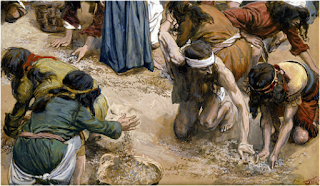 |
| Milky Way (Image: Pixabay) |
TO CHEW ON: “Those who are wise shall shine
Like the brightness of the firmament
And those who turn many to righteousness
Like the stars forever and ever." Daniel 12:3
Some years ago when we were cleaning up Mom’s apartment, preparing to move her to a tiny suite a fraction of the size of where she had lived, there was much stuff to dispose of. “Take this or that as a keepsake,” she’d urge us kids and grandkids. Very often the answer was “No thanks.” Mom's stuff was not what her family wanted as the legacy of this lovely lady.
Like my mom’s main legacy did not consist of stuff, neither does the legacy of the wise that Daniel speaks of in Daniel 12. Instead, we all understand the wish to leave a lasting legacy and hope that ours will be just that. Our verse today tells us that we do this when we “turn many to righteousness.” What does that mean?
The Amplified version expands on the phrase: “turn many to righteousness” (to uprightness and right standing with God).” The Message rephrases it to: “…those who put others on the right path to life ...” An expression used in many Christian circles to describe this activity is soul winning. Here are some conclusions about soul winning we can draw as we look at Bible passages that talk about it and the people who do it.
1. Soul-winning springs from the fellowship-desiring heart of God.- Luke 14:16-23.
2. It flows out of a right relationship with God - Psalm 51:12,13.
3. Soul-winners are motivated by their concern for others- James 5:20
4. The first soul-winners were trained by Christ. He is the great soul-winning trainer - Matthew 4:19; Mark 1:17
5. Soul-winners are willing to make great personal sacrifice to succeed - 1 Corinthians 9:19,20.
6. They are vigilant over the authenticity of their lives and what they teach - 1 Timothy 4:16.
7. Successful soul-winners realize their actions count as much as – may be more than – their words - 1 Peter 3:1.
8. Soul-winners are wise - Proverbs 11:30.
9. They consider soul-winning an assignment from God - 1 Thessalonians 2:1-4
10. Soul-winners don’t need ideal circumstances to be successful- Philemon 1:10
11. They persevere despite a lack of visible results - 1 Corinthians 7:12-16
12. The legacy they leave “…will shine… like the stars forever and ever.” - Daniel 12:3.
I ask myself, am I working on leaving such a legacy? Are you?
PRAYER: Dear God, thank You for entrusting me with the privilege and responsibility of influencing lives for You. Please teach me how to do this better. Amen.
MORE: Rita Springer: "All My Days"
*************
Unless otherwise noted all Scripture quotations are taken from the New King James Version®. Copyright © 1982 by Thomas Nelson, Inc. Used by permission. All rights reserved.







.png)











